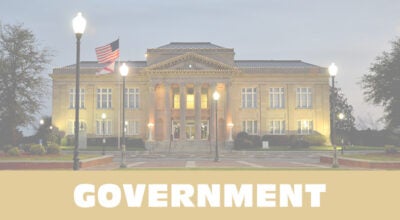United States of Snow
Published 7:02 pm Friday, February 12, 2010
Forget red and blue — color America white. There was snow on the ground in 49 states Friday. Hawaii was the holdout.
It was the United States of Snow, thanks to an unusual combination of weather patterns that dusted the U.S., including the skyscrapers of Dallas, the peach trees of Atlanta and the Florida Panhandle, where hurricanes are more common than snowflakes.
More than two-thirds of the nation’s land mass had snow on the ground when the day dawned, and then it snowed ever so slightly in Florida to make it 49 states out of 50.
At the same time, those weird weather forces are turning Canada’s Winter Olympics into the bring-your-own-snow games.
Who’s the Great White North now?
“I’m calling it the upside-down winter,” said David Robinson, head of the Global Snow Lab at Rutgers University in New Jersey.
Snow paralyzed and fascinated the Deep South on Friday. Snowball fights broke out at Southern Mississippi University, snow delayed flights at the busy Atlanta airport, and Louisiana hardware stores ran out of snow supplies. Andalusia, Ala., shut down its streets because of snow. And yet, Portland, Maine, where snow is usually a given, had to cancel its winter festival for lack of the stuff.
Weather geeks turned their eyes to Hawaii. In that tropical paradise, where a ski club strangely exists, observers were looking closely at the islands’ mountain peaks to see if they could find a trace of white to make it a rare 50-for-50 states with snow. But there was no snow in sight.
Hawaii’s 13,800-foot Mauna Kea volcano, which often gets snow much of the year at its higher elevations, is the most likely place in the 50th state to have snow, but there “is nothing right now,” said research meteorologist Tiziana Cherubini at the Mauna Kea Weather Center. It has been a few weeks since there has been snow in the mountains, and none is in the forecast, ruining a perfect 50-for-50, she said.
The idea of 50 states with snow is so strange that the federal office that collects weather statistics doesn’t keep track of that number and can’t say whether it has ever happened. The office can’t even say whether 49 out of 50 has ever taken place before.
Snow experts at the Global Snow Lab were combing their records but said it may be days before they find out if there has ever been a 50-for-50 snow day. Their best suspect — Jan. 19, 1977 — had snow in Florida, Louisiana, Mississippi, Alabama and Georgia, but then Robinson looked for snow in South Carolina and couldn’t find any.
As of early Friday morning, 67.1 percent of the U.S. had snow on the ground, with the average depth a healthy 8 inches. Normally, about 40 or 50 percent of the U.S. has snow cover this time of year, Robinson said.
It snowed for only 10 minutes in Century, Fla., just north of Pensacola, barely enough to scrape a few snowballs from the hood of a truck. But that was enough for 6-year-old Kaleb Pace.
“I’ve only ever seen snow on TV till now,” Kaleb said, smiling.
This is after a month that saw the most snow cover for any December in North America in the 43 years that records have been kept. And then came January 2010, which ranked No. 8 among all months for North American snow cover, with more than 7.03 million square miles of white.
The all-time record is February 1978, with 7.31 million square miles. There is a chance this February could break that. There is also a chance that this could go down as the week with the most snow cover on record, Robinson said.
Stay tuned. The weather pattern is in a snow rut.
At least in Washington, where snow is now measured by the yardstick, more snow may be coming soon. It looks like a little more snow on Monday and maybe a lot more about a week or so after that.
“As long as this pattern persists we have potential for additional storms,” said Dan Peterson, lead winter weather forecaster at the National Weather Service prediction center in Camp Springs, Md.
To count as snow cover, snow has to stick on the ground and be recorded at special stations at specific times when meteorologists check, Robinson said.
The strange snowfall pattern is produced by the El Nino weather phenomenon and its Arctic counterpart, Robinson and Petersen said.
During moderate to strong El Ninos like the current one, more moisture is pumped into the subtropical jet stream across the South, increasing precipitation, Robinson said. Then there’s the Arctic Oscillation, the Northern cousin to El Nino, which shifts cold polar air south. That cold air can turn a rainstorm into a snowstorm.
A snowy winter doesn’t disprove — or prove — global warming, Petersen and Robinson said. This is weather, which is variable, not long-term climate, and there is a huge difference.
“This has nothing to do with long-term trends,” Petersen said. “This is just a several-week period.”
Patrick Marsh, who is working on his doctorate in meteorology at the University of Oklahoma, has been trying to collect photos of snow on the ground in all 49 or 50 states. After his effort was publicized, he was flooded with photos and videos.
“It just shows that deep down inside, all of us is a weather weenie, a weather fanatic,” Marsh said. “This is just an awesome weather event.”





